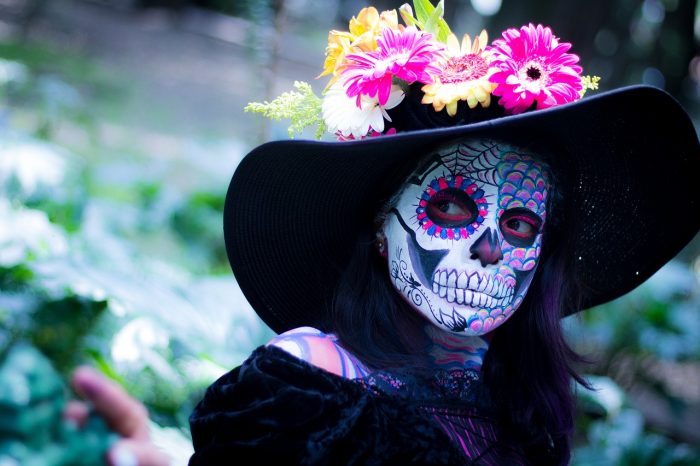Costumes are a fun and imaginative part of childhood, especially around Halloween.
Kids naturally want to dress up as their favorite characters and cultural icons, but may not understand that some costumes are inappropriate or insensitive to others.
Parents must consider whether their children’s admiration crosses into the territory of cultural appropriation when deciding on Halloween costumes to avoid disrespect and uncomfortable situations.
Here’s what you need to know so you can make the right call this Halloween.
Examining Cultural Appropriation
We hear the term “cultural appropriation” a lot, but what does it mean specifically and how does it relate to Halloween?
~
One of the most important things you can do for your vagina and your sex life—to avoid a world of problems later? Check out this device and get a free bag of craft coffee (code; EJCOFFEE)>>
~
Briefly, cultural appropriation is the adoption of the ideas, customs, practices, and clothing of another culture—usually a minority’s. It’s sometimes known as cultural misappropriation and is a disrespectful practice typically stemming from ignorance.
Why is cultural appropriation so offensive? Mainly, because it often reinforces harmful stereotypes, can belittle or mock another culture (even if unintentionally), and allows a dominant group to enjoy their privilege at the expense of a marginalized group.
That might seem like a lot of baggage for a Halloween costume, but it’s important to start these tough conversations early so you can raise a thoughtful, empathetic, and aware child.
Crossing Culture Barriers on Halloween
Transracial families face many challenges. Parents who’ve adopted children outside of their own ethnicity must display cultural competence that shows sensitivity and establishes admirable behavior that’s worth emulating.
These parents have to be willing to learn and introduce their adopted child to two cultures. For these children and parents, seeing cultural appropriation on Halloween can be a painful experience. A child who has a strong connection to their culture, whether adopted or not, may feel disrespected by others representing it casually, without knowing the background or the traditions of the culture.
Many parents have no qualms about letting their children dress up as an “Indian” or as a Chinese person because the child likes the costume. But crossing these cultural barriers, even on Halloween, can do more harm than parents might imagine at first glance.
Avoiding Cultural Appropriation During Halloween
So now that we have a more thorough understanding of why it’s so important to avoid cultural appropriation in choosing Halloween costumes, how can you help your child choose a costume that’s appropriate? What should you avoid?
First, think about which, if any, stereotypes are perpetuated by the costume. A good example of this is dressing up as a representation of an entire race or ethnicity, like a generic “Mexican,” “Italian,” or “Japanese” costume. These are not appropriate and it’s important to teach your children from an early age that lazy stereotypes of ethnic, racial, or cultural groups are not okay.
If your child wants to dress up as a specific role model or a fictional character of another race or cultural group, then that may be okay. But it’s important to be respectful and to ensure that no appropriation, just admiration, is part of the outfit.
Although by now it should be obvious, don’t let your child change the color of their skin for the sake of a costume. Blackface is offensive and should never be allowed on Halloween or at any other time. Body paint can also be problematic if it falls under the category of cultural appropriation, like face paint as part of an “Indian” costume.
Finally, think about how you’d feel if someone of the group your child’s costume is representing saw them wearing it. Would you feel awkward? Embarrassed? This can be a good way to determine if the costume is appropriate.
There are lots of great Halloween costume options for kids that don’t come anywhere near to appropriation. With some thought and creativity, you and your child can find a costume you can both get excited about that won’t cross a line.
Celebrating Diversity and Practicing Sensitivity From a Young Age
If your child is excited about a potentially appropriating costume, then you may need to initiate a tough conversation. Focus the conversation on kindness, and remember that the earlier you start talking about these issues, the better. Diversity and inclusion are important in every aspect of life.
In the past, university students have expressed their disapproval of costumes that promote harmful stereotypes and reinforce historical oppression. Let’s all do better and get our kids thinking about how to be sensitive from a young age so they can grow up to be respectful, mindful adults.
Ready to join?
Hey, thanks so much for reading! Elephant offers 1 article every month for free.
If you want more, grab a subscription for unlimited reads for $5/year (normally, it's $108/year, and the discount ends soon).
And clearly you appreciate mindfulness with a sense of humor and integrity! Why not join the Elephant community, become an Elephriend?
Your investment will help Elephant Journal invest in our editors and writers who promote your values to create the change you want to see in your world!
Already have an account? Log in.
Ready to join?
Hey, thanks so much for reading! Elephant offers 1 article every month for free.
If you want more, grab a subscription for unlimited reads for $5/year (normally, it's $108/year, and the discount ends soon).
And clearly you appreciate mindfulness with a sense of humor and integrity! Why not join the Elephant community, become an Elephriend?
Your investment will help Elephant Journal invest in our editors and writers who promote your values to create the change you want to see in your world!
Already have an account? Log in.

 Share on bsky
Share on bsky







Read 11 comments and reply